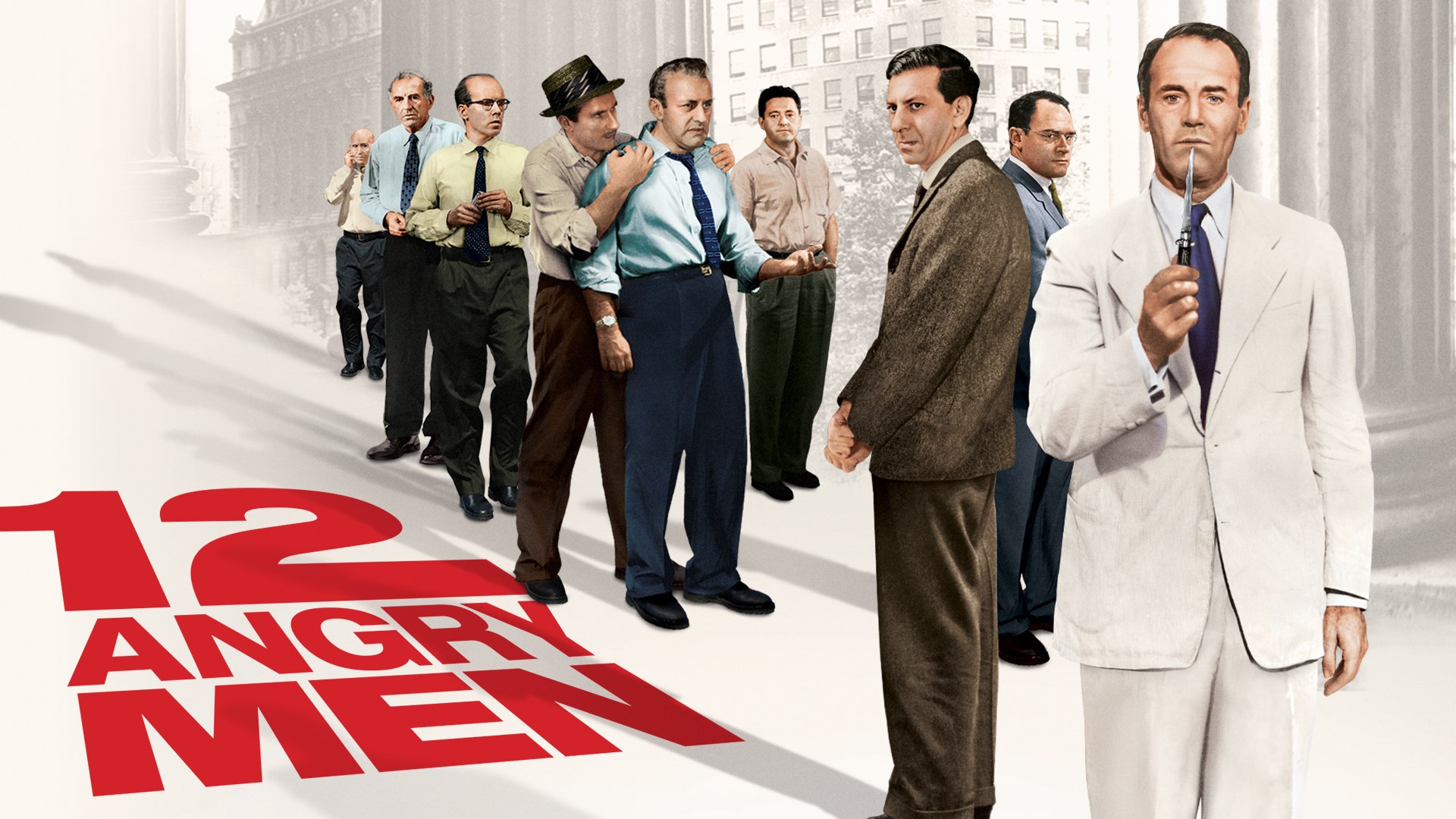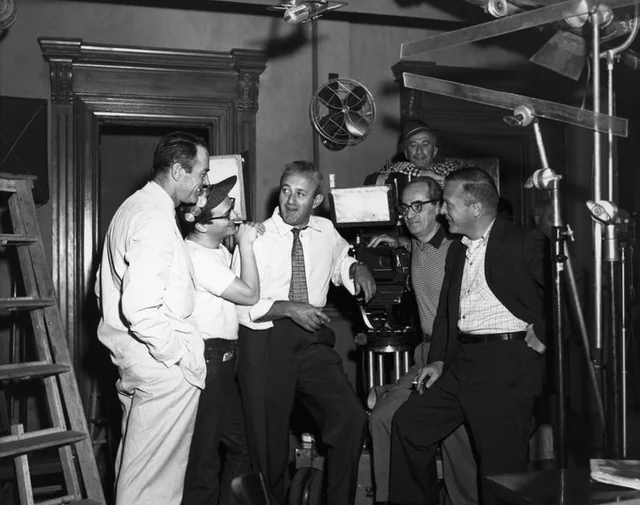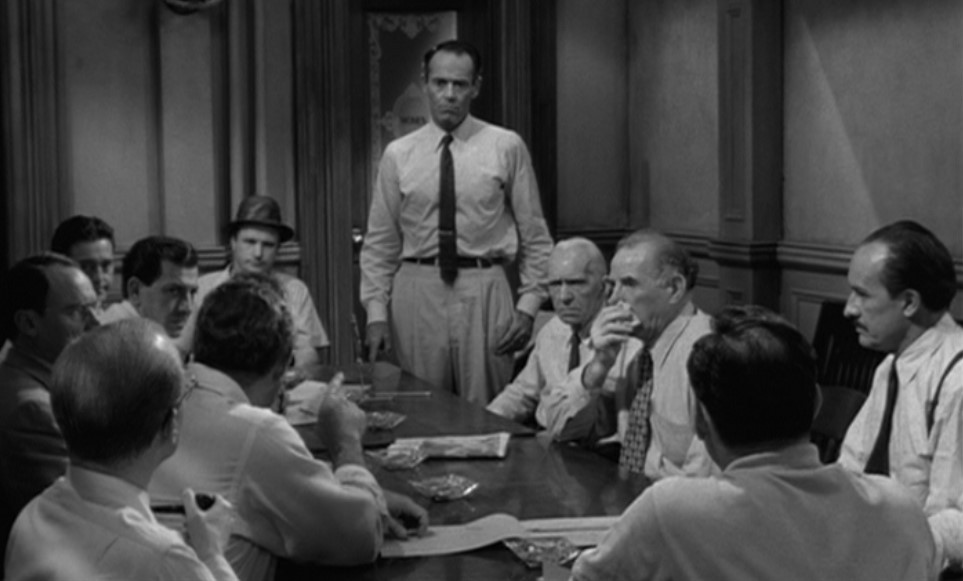🎬 12 Angry Men (1957)

12 Angry Men (1957), directed by Sidney Lumet, is a critically acclaimed courtroom drama that explores the complexities of the American judicial system and the moral responsibility of jurors. The film is based on Reginald Rose’s teleplay of the same name and features a talented ensemble cast, including Henry Fonda, Lee J. Cobb, Ed Begley, and Jack Klugman.
Plot Summary:

The film centers on a jury deliberating the fate of a teenage boy accused of murder. The evidence appears overwhelmingly against him, and all but one juror, Juror #8 (played by Henry Fonda), initially vote for conviction. The story unfolds entirely within the confines of the jury room, where tensions rise as Juror #8 begins to question the evidence and the motives behind his fellow jurors’ decisions. He advocates for a thorough discussion, insisting that reasonable doubt must be considered.
As the deliberation progresses, personal biases, prejudices, and emotions come to the forefront, revealing each juror’s character and background. The film’s tension builds as Juror #8 systematically dismantles the prosecution’s case, leading the other jurors to confront their own beliefs and assumptions.
Themes:
- Justice and Moral Responsibility: The film emphasizes the importance of due process and the heavy burden of making life-and-death decisions. It raises questions about the ethics of the justice system and the responsibilities of jurors.
- Prejudice and Bias: The jurors’ backgrounds and biases significantly influence their perspectives, illustrating how personal experiences can shape one’s judgment and decision-making.
- The Power of Reasoned Debate: The film showcases the value of critical thinking and open dialogue, suggesting that understanding differing viewpoints is essential for reaching a fair conclusion.
- Individual vs. Group Dynamics: It explores how groupthink can lead to poor decisions, highlighting the tension between individual conscience and collective pressure.
Cinematic Style:

12 Angry Men is notable for its minimalistic setting, as the entire film takes place in the jury room. This claustrophobic environment heightens the drama and emphasizes the intensity of the discussions. Lumet’s direction employs tight close-ups and varying camera angles to capture the characters’ emotions and reactions, adding to the film’s tension. The black-and-white cinematography enhances the starkness of the narrative and the moral dilemmas faced by the jurors.
Reception and Legacy:
Upon its release, 12 Angry Men received critical acclaim but had a modest box office performance. Over time, it has been re-evaluated and is now regarded as one of the greatest films in cinema history. The film was nominated for three Academy Awards and has influenced numerous filmmakers and works in the courtroom drama genre.
Its exploration of justice, morality, and the human condition resonates with audiences, making it a relevant and enduring piece of cinema. In 2007, the film was selected for preservation in the United States National Film Registry by the Library of Congress, underscoring its cultural significance.
Overall, 12 Angry Men remains a powerful commentary on the justice system, the complexities of human behavior, and the importance of standing up for one’s beliefs. For further information, you can check sources like and Rotten Tomatoes.
Suggested videos for you:
The Haunting of Alice: A Finnish Soldier’s Revenge | SISU 2022
Suggested videos for you:
Meg 2 : Jaws of Terror: A Deadly Encounter in the Deep
Suggested videos for you:
The Turning Point of World War II: The Battle of Midway
Suggested videos for you:
Rambo: The Last Stand ( 2008 ) | Movie Action
Suggested videos for you:
Against the Odds: A Fractured Alliance
Suggested videos for you:
Latest Furiosa 2024 is a Fan Favorite
Suggested videos for you:
Betrayal at the Table: A Dinner Gone Wrong
Suggested videos for you:
When Human Blood Runs Dry, The Vampire Empire Begins to Crumble Daybreakers( 2009 )











